Colebrooke is a village and parish in Devon, England about 8 km west of Crediton. The main point of interest is the church and the connection to Henry Kingsley's novel The Recollections of Geoffry Hamlyn. Also Uncle Tom Cobley, of the folk song, signed his will at Pascoe House, but is buried 4 miles west at Spreyton. The champion Devon wrestler, Abraham Cann was born and buried here. He won the all-comers wrestling crown in London.
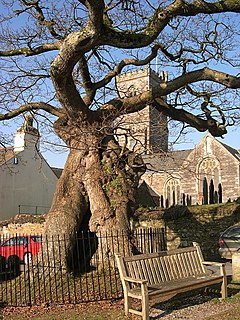
Meavy is a small village, civil parish and former manor in the English county of Devon. Meavy forms part of the district of West Devon. It lies a mile or so east of Yelverton. The River Meavy runs near the village. For administrative purposes the parish is grouped with the parishes of Sheepstor and Walkhampton to form Burrator Parish Council, and for electoral purposes it is grouped with the same two parishes to form Burrator Ward.

Bratton Clovelly is a village, parish and former manor in the west part of Devon, England. It is situated about 8 miles (13 km) south-west of Okehampton immediately north of the A30 road. The manor of Bratton Clovelly was listed in the Domesday Book of 1086. The parish church dedicated to St Mary is 15th-century, with many Norman features. The former village stocks are kept in the belfry. The parish is thought to have been the birthplace of influential 13th-century jurist Henry de Bracton; however, this claim is also made for at least two other places.
Bowden is a historic estate in the parish of Yealmpton in Devon, England. From the 15th century until 1748 the manor house was for eight generations the seat of a junior branch of the Copleston family of Copplestone. The manor house was largely rebuilt in the 19th century and, together with some of its outbuildings, now serves as a farmhouse.

Sir Richard Edgcumbe of Cotehele in the parish of Calstock in Cornwall, was an English courtier and Member of Parliament.

Sir Thomas Wise, KB, of Sydenham in the parish of Marystow and of Mount Wise in the parish of Stoke Damerel in Devon, was Sheriff of Devon in 1612 and in 1621 served as a member of parliament for Bere Alston in Devon.

Sir John Fowell, 2nd Baronet of Fowelscombe in the parish of Ugborough in Devon, was thrice elected a Member of Parliament for Ashburton in Devon, between 1659 and 1677. He fought in the Parliamentary army during the Civil War and following the Restoration of the Monarchy was appointed in 1666 by King Charles II Vice-Admiral of Devon.

Kentisbeare is a village and civil parish in the Mid Devon district of Devon, England. Its nearest town is Cullompton.

Sir John Fowell, 3rd Baronet of Fowelscombe in the parish of Ugborough in Devon, was an English politician who sat in the House of Commons from 1689 to 1692.

Bradfield House is a Grade I listed country house situated in the parish of Uffculme, Devon, England, 2 miles (3.2 km) south-west of the village of Uffculme.

John Arscott (1613-1675), of Tetcott, Devon, was Sheriff of Devon in 1675.

Bableigh is an historic estate in the parish of Parkham in North Devon, England. It is separated from the village of Parkham by the Bableigh Brook. It was the earliest recorded seat of the Risdon family in Devonshire, from which was descended the Devon historian Tristram Risdon.
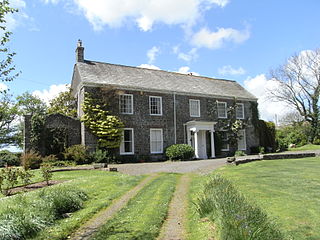
Thuborough in the parish of Sutcombe, Devon, England, is an historic estate, formerly a seat of a branch of the Prideaux family, also seated at Orcharton, Modbury; Adeston, Holbeton; Soldon, Holsworthy; Netherton, Farway; Ashburton; Nutwell, Woodbury; Ford Abbey, Thorncombe, all in Devon and at Prideaux Place, Padstow and Prideaux Castle, Luxulyan, in Cornwall. The present mansion house, comprising "Thuborough House" and "Thuborough Barton", the north-east block, is a grade II listed building.

Milton Abbot is a village, parish, and former manor in Devon, 6 miles (9.7 km) north-west of Tavistock, Devon, and 6 miles (9.7 km) south-east of Launceston, Cornwall.
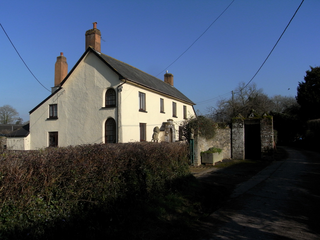
Moor Hays is a historic estate in the parish of Cullompton in Devon, England. It is stated incorrectly to be in the nearby parish of Burlescombe in Tristram Risdon's Survey of Devon. The estate is not to be confused with Moor Hayes in the parish of Washfield, about 3 miles north-west of Tiverton, another ancient farmstead, which since 2005 has been the site of a large housing estate named "Moorhayes".

Wortham is an historic manor within the parish of Lifton in Devon, England. The early sixteenth century manor house survives, today the property of the Landmark Trust. It was long the seat of the Dynham family, a junior branch descended from the Anglo-Norman magnate Baron Dynham. A mural monument survives in Lifton Church to John Dynham (d.1641) of Wortham, consisting of an escutcheon showing the arms of Dynham of Wortham impaling Harris of Hayne ) with the crest of Dynham above: An arm couped or hand azure holding a lock of hair sable, with an inscribed tablet beneath. John Dynham (d.1641) was the last in the male line and married Margaret Harris (d.1650), a daughter of Arthur Harris (1561-1628) of Hayne in the parish of Stowford and lord of the manor of Lifton, both in Devon, and of Kenegie in the parish of Gulval in Cornwall, Sheriff of Cornwall in 1603 and Captain of St Michael's Mount, Cornwall. Arthur Harris's grandfather John Harris (d.1551) of Hayne, a Serjeant-at-Law and Recorder of Exeter, had purchased the manor of Lifton from the Nevile family, Earls of Northumberland. John Dynham (d.1641) died without children whereupon his heir was his niece Mary Hex, a daughter of his sister Margaret Dynham by her husband John Hex of Alternon in Cornwall, who married John Harris of Lifton, consequently Wortham passed to the Harris family.
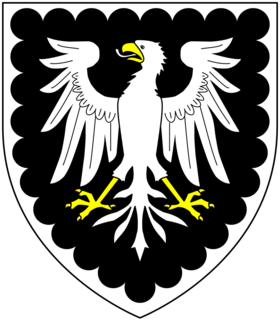
Walter Palk (1742-1819), of Marley House in the parish of Rattery, Devon, England, was a Member of Parliament for his family's Pocket Borough of Ashburton in Devon from 1796 to 1811. He served as Sheriff of Devon (1791-2) and in 1798 was a Captain in the Ashburton Volunteer Militia, one of many such units formed across Devon to counter a possible invasion by Napoleon.

Walter Reynell was a Member of Parliament for Devon in 1404.

Walter Reynell of Malston in the parish of Sherford, Devon, was a Member of Parliament for Devon in 1454/55.
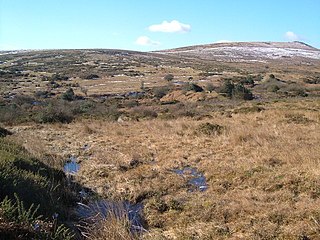
Bagtor is an historic estate in the parish of Ilsington in Devon, England. It was the birthplace of John Ford (1586-c.1639) the playwright and poet. The Elizabethan mansion of the Ford family survives today at Bagtor as the service wing of a later house appended in about 1700.
















